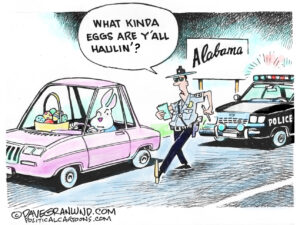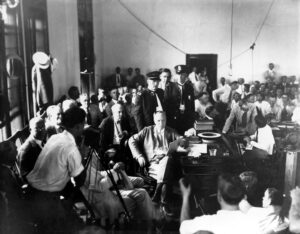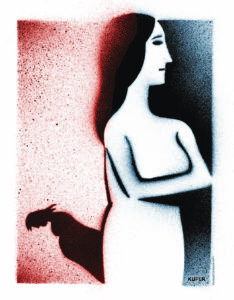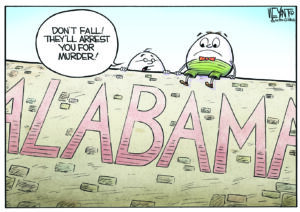Searching for ‘Famous Men’ in Alabama: Mike Davis on His Favorite Banned Book
When I first witnessed a blood-red Alabama sunset, I thought of the Gudger and Ricketts families, their backs bent under the heavy bags of cotton, looking at this biblical ending to their long day of toil. The urge to re-read Agee was overwhelming. Author James Agee in May 1958. AP
Author James Agee in May 1958. AP
Editor’s note: Mike Davis wrote this piece as part of Truthdig’s celebration of Banned Books Week. Readers: Add your favorite titles to the comments here or on our Facebook page.
In July and August 1974, I was on a road trip through the South with my crazy dog Ron: visiting comrades from Vietnam Veterans Against the War, recording some labor wars for KPFK (we got shot at by scabs in Harlan County, Ken.) and savoring the last days of Richard Nixon. It was my first sweat-drenched Southern summer with the afternoon rains that instantly steamed from the pavement, lightning crackling in the hills like an unfinished Civil War battle and the heavy lingering scent of unfamiliar flowers.
In Birmingham, Ala., still the coal and steel metropolis of Dixie, we stayed with Josh and Jay for a week. Josh had founded the CORE chapter at Santa Monica City College in 1963, organized an antiwar GI coffeehouse in Texas in the middle ’60s, and was now agitating for communism in a sweltering oven factory a few degrees hotter than hell itself.
Seven years earlier in Austin, Texas, when I was a homeless SDS kid, someone had lent me a copy of James Agee’s “Let Us Now Praise Famous Men.” Then I was in Alabama, where Agee had been sent on assignment for Fortune magazine in 1936, living “as a spy” with white sharecroppers who, like their black neighbors, were the poorest, most exploited people in America.
When I first witnessed a blood-red Alabama sunset — an astonishing sight for a Southern Californian used to Ed Ruscha-like pastel skies — I thought of the Gudger and Ricketts families, their backs bent under the heavy bags of cotton, looking at this biblical ending to their long day of toil. The urge to re-read Agee was overwhelming, so I left the dog and his friends at a Saturday Maoist barbecue and went downtown to Birmingham’s leading bookstore.
The range and sophistication of the fiction shelves would have been impressive even in the Village or Harvard Square; the nonfiction, less so. I expected to find Agee in the wall of classic books on the South, but he wasn’t there.
The owner was a formidably elegant and quite beautiful woman in her late 40s; obviously her ancestors had owned plantations before bookstores. When I asked about Agee, she arched her brows, slightly shook her head as to indicate “shame, shame,” and firmly said (imagine Bull Connor after elocution lessons): “No, we don’t carry THAT book, no one in Alabama ever has, and no one ever will.” Then she turned away and walked to the door, a signal that I should immediately leave the bookstore.
I felt oddly elated. Agee was long dead, but in Alabama he was still banned and dangerous — a book review he would have loved.
Your support matters…Independent journalism is under threat and overshadowed by heavily funded mainstream media.
You can help level the playing field. Become a member.
Your tax-deductible contribution keeps us digging beneath the headlines to give you thought-provoking, investigative reporting and analysis that unearths what's really happening- without compromise.
Give today to support our courageous, independent journalists.








You need to be a supporter to comment.
There are currently no responses to this article.
Be the first to respond.